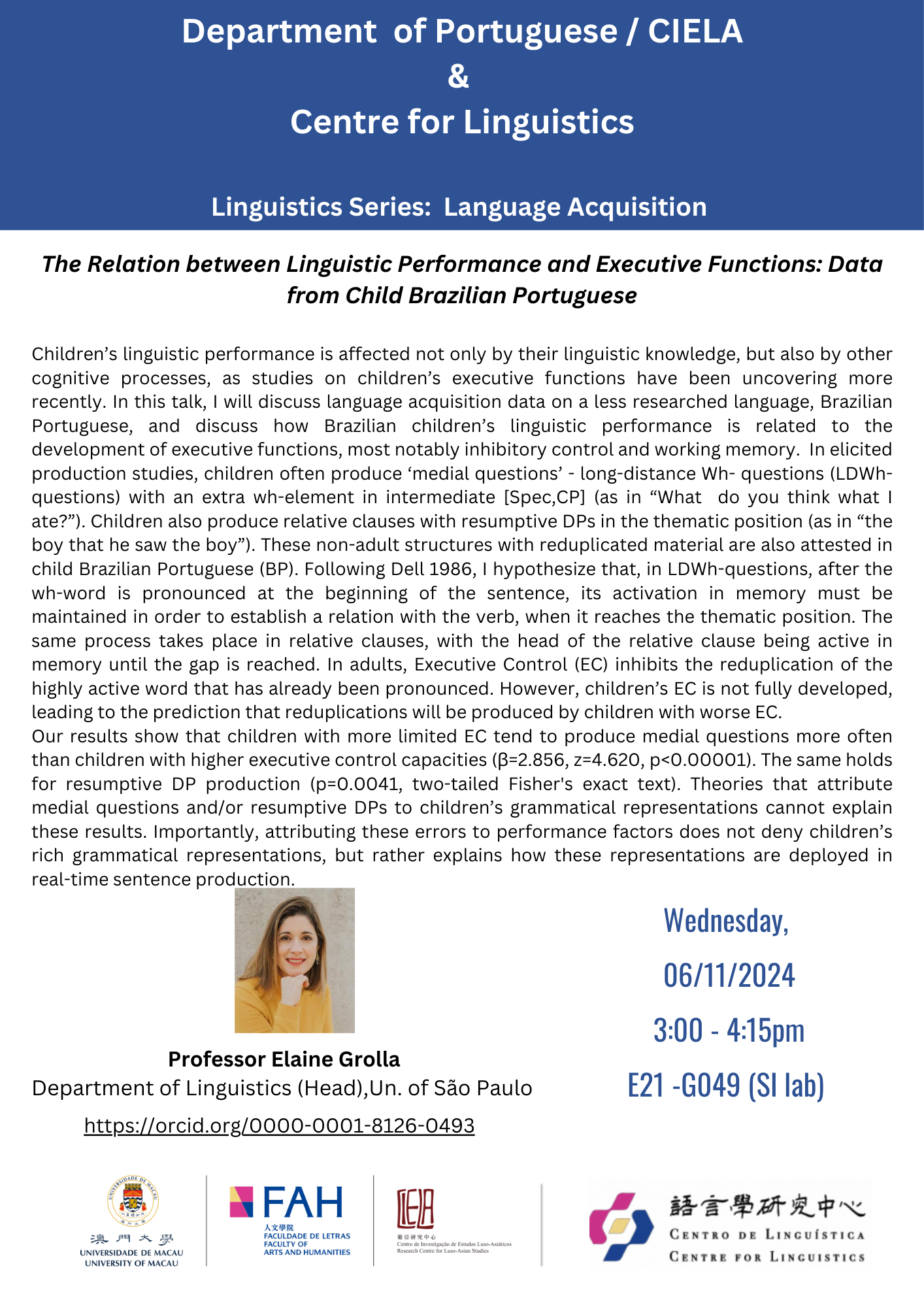

UM-FAH-DPORT: Seminar by Professor Elaine Grolla on “The Relation between Linguistic Performance and Executive Functions: Data from Child Brazilian Portuguese”
2024-11-06 @ 3:00 pm ~ 4:30 pm
Dear Professors and Students,
We are most pleased to invite all to attend the following Seminar on “The Relation between Linguistic Performance and Executive Functions: Data from Child Brazilian Portuguese” by Professor Elaine Grolla, Associate Professor and Head of the Department of Linguistics, University of São Paulo (Brazil), on Wednesday, 06/11/2024, at 3:00pm in room E21-G049 (SI Lab).
BIO
Elaine Grolla is an Associate Professor at the Department of Linguistics at the University of São Paulo and a research productivity fellow from CNPq (the Brazilian National Center for Research). Since January 2024, she has been associate editor of the journal Language Acquisition. She obtained her doctorate in Linguistics from the University of Connecticut (USA) in 2005. She completed postdoctoral studies at the University of São Paulo (2006) and at the University of Maryland, USA (2014-2015).
She is the founder and coordinator of LEAL/USP – Laboratório de Estudos em Aquisição de Linguagem (Language Acquisition Studies Laboratory), where she develops and guides research on the development of syntactic and semantic aspects of Brazilian Portuguese as a first language.
Her line of research is Studies of language acquisition and learning processes. Elaine Grolla has, to this date, 45 publications, both journal articles and book chapters, as the only author and in co-authorship. Her full CV may be found the following web pages:
http://buscatextual.cnpq.br/buscatextual/visualizacv.do?id=K4759486D2;
https://www.researchgate.net/profile/Elaine-Grolla;
https://orcid.org/0000-0001-8126-0493
https://usp-br.academia.edu/ElaineGrolla
ABSTRACT
The Relation between Linguistic Performance and Executive Functions: Data from Child Brazilian Portuguese
Children’s linguistic performance is affected not only by their linguistic knowledge, but also by other cognitive processes, as studies on children’s executive functions have been uncovering more recently. In this talk, I will discuss language acquisition data on a less researched language, Brazilian Portuguese, and discuss how Brazilian children’s linguistic performance is related to the development of executive functions, most notably inhibitory control and working memory.
In elicited production studies, children often produce ‘medial questions’ – long-distance Whquestions (LDWh-questions) with an extra wh-element in intermediate [Spec,CP] (as in “What do you think what I ate?”). Children also produce relative clauses with resumptive DPs in the thematic position (as in “the boy that he saw the boy”). These non-adult structures with reduplicated material are also attested in child Brazilian Portuguese (BP).
Following Dell 1986, I hypothesize that, in LDWh-questions, after the wh-word is pronounced at the beginning of the sentence, its activation in memory must be maintained in order to establish a relation with the verb, when it reaches the thematic position. The same process takes place in relative clauses, with the head of the relative clause being active in memory until the gap is reached. In adults, Executive Control (EC) inhibits the reduplication of the highly active word that has already been pronounced. However, children’s EC is not fully developed, leading to the prediction that reduplications will be produced by children with worse EC.
Two studies were conducted, one on LDWh-questions (70 children (age-range: 4;1 – 6;6)) and one on relative clauses (52 children (age-tange: 3;9 – 6;6)). Each study involved a linguistic task eliciting the relevant construction and 2 tasks measuring children’s EC. Our results show that children with more limited EC tend to produce medial questions more often than children with higher executive control capacities (β=2.856, z=4.620, p<0.00001). The same holds for resumptive DP production (p=0.0041, two-tailed Fisher’s exact text). Theories that attribute medial questions and/or resumptive DPs to children’s grammatical representations cannot explain these results. Importantly, attributing these errors to performance factors does not deny children’s rich grammatical representations, but rather explains how these representations are deployed in real-time sentence production.
IN ENGLISH LANGUAGE

